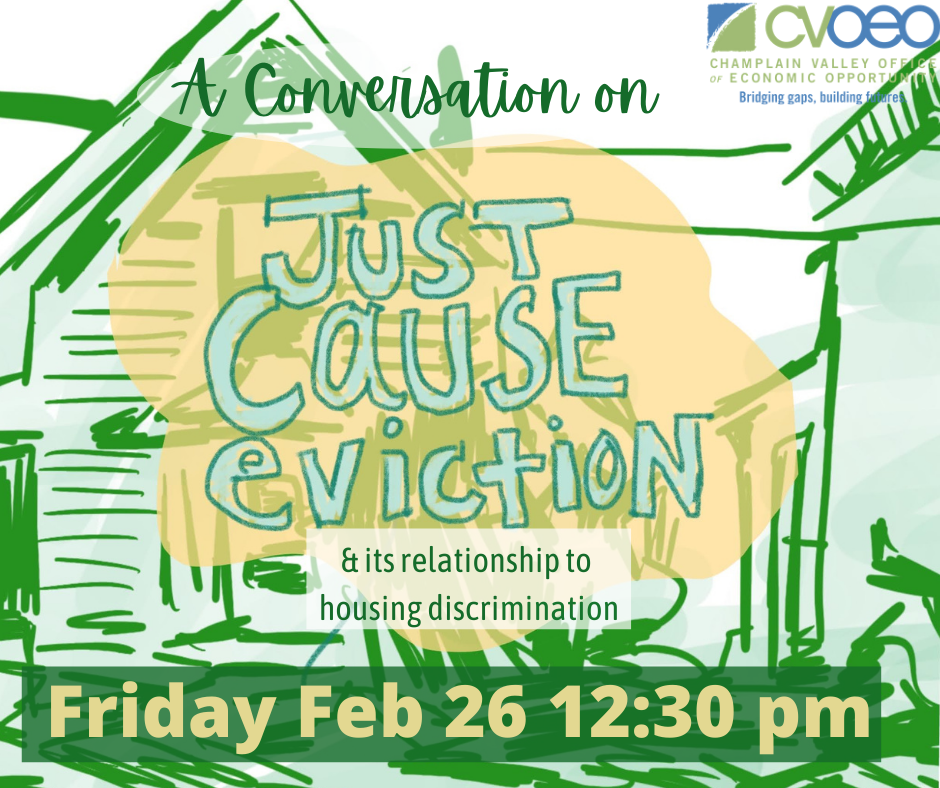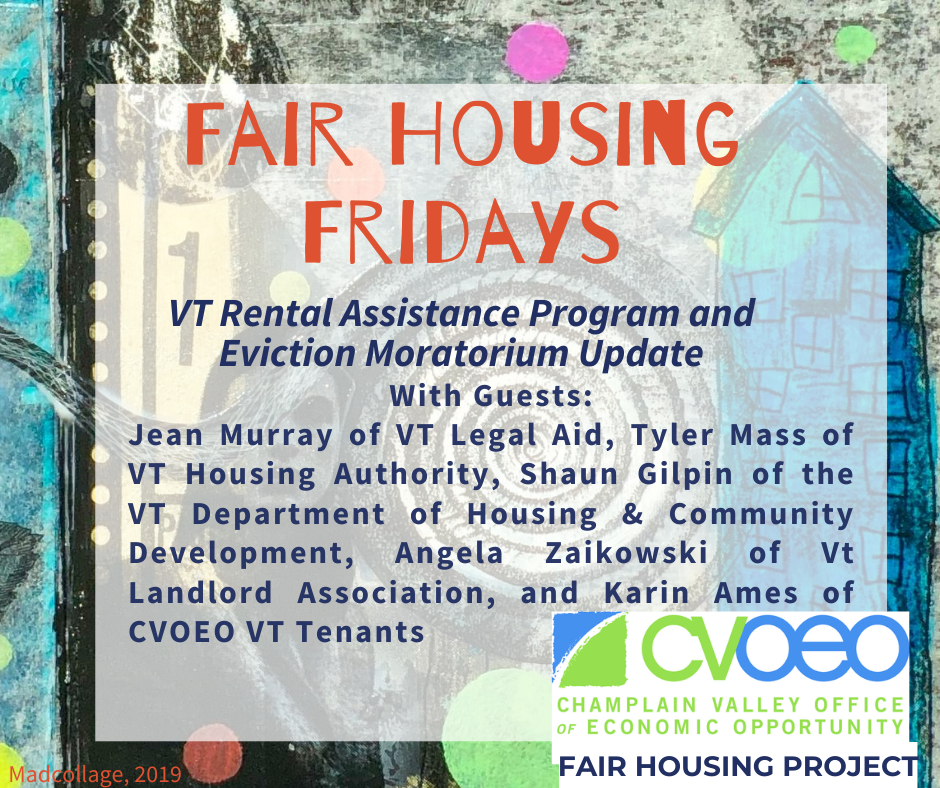Continue reading Rental Housing Safety Bill will Bring Efficiency, Consistency, and Opportunity
Category Archives: fair housing
Join Us to Celebrate Fair Housing Month
It is almost our favorite time of year here at the Fair Housing Project of CVOEO- Fair Housing Month!
Each April at CVOEO’s Fair Housing Project, we celebrate the 1968 passage of the Fair Housing Act with a series of public education and art events to raise awareness about housing discrimination in Vermont and the positive role that inclusive, affordable housing plays in thriving communities. To promote Fair Housing education and awareness, the Fair Housing Project facilitates a series of zoom webinars, Fair Housing workshops, and art activities, prompting participants to reflect on what Fair Housing means in their community.
Join us!
There are a variety of ways you, your community, or your organization can participate in the celebration this year, despite us being unable to meet in person. Our Fair Housing Month calendar is filling with events hosted by us and organizations across the state, including Fair Housing Friday zoom webinars, the Old North End Art Center’s art camps, and HeART & Home community art project, library book and film discussions, and Fair Housing workshops.
Let us know how you, your community, or your organization would like to participate by filling out this brief form.
(Of course, we anticipate these activities will be held remotely, and when possible, outdoors with physical distancing.)
Here are some examples of the variety of ways you can join us in celebrating Fair Housing Month:
- Host an event in your community focusing on the history and impact of the Fair Housing Act, local housing needs, or the value of diversity and inclusion in housing (which we will add to our Fair Housing Month event calendar)
- Participate in the HeART & Home Community Art Project, or lead a HeART & Home Community Art activity in your community/classroom/organization
- Participate as a panelist in one of our three Fair Housing Fridays
- Invite us to do a Fair Housing workshop with your community/organization
- Start a discussion group in your organization or community (see list of books and films at https://libraries.vermont.gov/fairhousing2021)
This year we have a new partnership with the Vermont Department of Libraries and Vermont Library Association for new activities, like book discussion groups, story walks, and more at sites all over the state. Click here to learn more!

Are you curious about our HeART & Home Community Art Project? Check out a couple of the prompts we are sharing with our project participants.
For examples of past activities and to see this year’s full calendar of events (which will be posted later this month), visit www.FairHousingMonthVT.org.
If you are interested in participating in any capacity in our Fair Housing Month Celebration, please fill out this brief form.
Fair Housing Month activities in Vermont are coordinated by the Fair Housing Project of CVOEO, in collaboration with Vermont Department of Libraries, Vermont Library Association, ONE Arts Center, Vermont Legal Aid, Vermont Human Rights Commission, VT Department of Housing and Community Development, and other partners. This program is supported by a Department of Housing and Urban Development (HUD) Fair Housing Initiatives Program grant and supported by the Institute of Museum and Library Services, a federal agency, through the Library Service and Technology Act as administered by the Vermont Department of Libraries.
Fair Housing is the right to equal opportunity in housing choice and the right to rent, buy, finance, and live in a home free from discrimination or harassment. The federal Fair Housing Act prohibits discrimination concerning the sale, rental, and financing of housing based on race, color, religion, national origin, sex, and as amended, disability and family status. This also covers harassment, including sexual harassment.
Vermont has additional protections based on age, marital status, sexual orientation, gender identity, receipt of public assistance, being a victim of domestic violence, sexual assault, or stalking, and denial of development permitting based on the income of prospective residents.
To learn more about your Fair Housing rights and responsibilities, visit www.cvoeo.org/fhp and see www.fairhousingmonthvt.org for April fair Housing Month details. Contact us at fhp@cvoeo.org.
Just cause increases household health and stability
This is part of a series of commentaries by CVOEO and Vermont Legal Aid in support of Just Cause Eviction policy. The series includes:
- No Cause Eviction Law is an Unjust Law by CVOEO Executive Director Paul Dragon
- Just Cause is a Racial Justice Issue by Devon Ayers and Erika Johnson of Vermont Legal Aid’s Housing Discrimination Law Project
By Housing Navigator Ryan Murphy and Director Sandrine Kibuey, Housing Advocacy Programs, CVOEO
Thousands of Vermont renters live day-to-day, in precarious housing, uncertain of how they will be able to make ends meet and afford the rent, buy food, or put gas in their car to get to work. It is a constant struggle and COVID-19 has deepened the impact of these daily struggles. The state and federal eviction moratoriums have provided temporary relief to many tenants, but the fear of being evicted is nonetheless real. And on top of it all, the question about why and when is also a great source of stress as a “no cause” eviction is a possibility for all tenants living in Vermont.
Vermont housing law allows landlords to evict any tenant for any reason with as little as 90 days’ notice and no-cause eviction is particularly worrisome for families, older Vermonters, as well as people of color. For many, this experience has been one of extreme consequences; here are a few examples.
Maintenance complaints and retaliation
Jeffrey and his partner, Abigail, received a no-cause lease termination notice this winter after almost a decade in the same home. He was not totally happy with the apartment as the heat had been cutting out, the wooden floors splintered his kids’ feet, and the driveway iced over so badly that he had once fallen and broken his leg.
Jeffrey had verbally complained to the landlord about these issues many times and he even had a few records of his complaints in his email outbox and ‘sent’ text messages. His landlord lived down the block, and Jeffrey felt that hand-delivering a letter, or sending one via certified delivery, might come off as petty and antagonizing but finally decided to send one.
It was hard not to feel like the eviction notice had come as retaliation for frequent repair requests. In Vermont, landlords are prohibited from practicing this kind of retaliation, but there is no mechanism to stop them from delivering no-cause termination notices. If the landlord’s case against Jeffrey went to court, Jeffrey might stand a chance of winning. Because of COVID, though, eviction cases are “stayed.” Technically, Jeffrey and his family could stay in the apartment until the end of the moratorium, but then they could risk getting an eviction for cause as holdover tenants and ruin their housing history for a long time.
It was clear to Jeffrey and Abigail that they needed to line up a new place to live. After weeks of scouring the internet for available, affordable apartments around Burlington, they made the difficult decision to put down a deposit on a place in a neighboring state. They did not see the benefit of engaging in a big fight to stay in a home that would still need many repairs and a landlord resenting them, refusing to address these habitability issues.
From stability to eviction
On the last day of 2020, John’s family received a no-cause lease termination notice. It was yet another difficulty in a challenging year. John imagined trying to explain his current situation to the person he’d been only 12 months ago.
In March, John had been furloughed from his lucrative job as a contractor, and then he had been let go entirely. His job had been the family’s sole source of income. John had always made enough money to take care of himself, his wife, and his kids. Despite his job loss, he was grateful that he had enough in his financial safety net to keep current on rent for a couple of months until the pandemic ended.
A couple of months turned into a few, so John and Michaela applied for the Rental Housing Stabilization Program. They’d never had to apply for any kind of assistance before, but the deal was too good to pass up. The money would cover four months’ rent in full as long as their landlord agreed to sign their application. The landlord did agree to sign it, but in doing so, saw that the couple was in dire financial straits.
John finally found work again, though at a lower salary. His paychecks went towards paying off past-due medical bills and the credit cards that had been maxed out buying groceries and gas. Interest kept accruing and so many creditors called that he and Michaela couldn’t tell which were legitimate and which were scammers.
Then then the car got repossessed. John’s credit score took a 100-point nosedive. He still needed to get to work and couldn’t deal with another monthly debt payment, so he found a car on Craigslist and bought it outright. Registration, titling, and inspection would cost the equivalent of 16 hours’ pay assuming that nothing needed repair.
Then, in December, he was holding a piece of paper that ordered his family to pack up and leave in 90 days. In agreeing to the Rental Housing Stabilization Program, John’s landlord had agreed not to evict him for nonpayment, but there were no protections against no-cause eviction. There was also a statewide eviction moratorium, but it was slated to end two weeks before the day the needed to be out. Although John’s family could only be forced to leave their home through a court order, staying in their home past the date on the eviction notice could cause them to be evicted for cause as holdover tenants.
With a low credit score, low income, and an eviction proceeding hanging over their heads, John was not hopeful about their prospects. It was completely defeating. He had never worked so hard in his life, but the more he tried to keep his family afloat, the more they only seemed to get further underwater.
Eviction is a traumatic event with lasting effects on a person and family’s emotional, social, and physical well-being. These conditions affect a person’s ability to lead a healthy life and deepen health disparities. Voting “yes” for just cause eviction would offer renters a modicum of security by requiring landlords to provide a good reason for evicting their tenants. Just cause would increase overall housing stability, which leads to stronger and more vibrant communities.
To learn more about this issue, view the Feb. 26 Fair Housing Friday webinar.
Fair Housing Friday: Just Cause Eviction & Why It is Important for Housing Equity Feb 26
Join us for a lunchtime conversation on Just Cause Eviction on Friday, Feb. 26 – 12:30-1:30pm.
Panelists include Brian Pine, speaking on behalf of the Just Cause Coalition, Michael Monte from Champlain Housing Trust, Bor Yang from the Vermont Human Rights Commission, and Christie Delphia from the Burlington Tenants Union.
This conversation will highlight the ways language similar to Just Cause is already being used by nonprofit housers across Vermont, why evictions should be avoided & when they are actually necessary, and how Just Cause can combat housing discrimination. This lunchtime conversation will be recorded and have time at the end for a Q & A session.
Register using this link: https://us02web.zoom.us/meeting/register/tZIvd-2hrDovG90HXUx0PDe1zXZYj6e7HHnI
And you can share our facebook event here:
http://https://www.facebook.com/events/451236372739293
Regarding the Just Cause Opposition’s recent disinformation campaign:
On Monday Morning of February 22nd, leaders from Rights & Democracy VT, Vermont Affordable Housing Coalition, The Black Perspective, Burlington City Council, Burlington Tenants Union, Burlington VT Democrats Vermont, state representative Kesha Ram -among others- came forward to address a recent disinformation campaign lead by the opposition to Just Cause. Leaders condemn the red lawn signs designed to scare tenants, spread baseless statements and co-op racial equity language.
And here is the Vermont Affordable Housing Coalitions response to this recent smear campaign: https://www.vtaffordablehousing.org/2021/02/19/the-vermont-affordable-housing-coalition-fully-supports-the-burlington-just-cause-charter-change-proposal/
Understanding Protections Against Sexual Harassments in Housing
ft. Emily Collins, Civil Rights Specialist Contractor for The United States Attorney’s Office of the District of Vermont
This guest blog feature is by Emily Collins, a Civil Rights Specialist, Contractor for Vermont’s United States Attorney’s Office . The United States Attorney’s Office is one of the resources available for folks who want to file a complaint about housing discrimination, particularly if there are patterns or practices of discrimination. CVOEO’s Fair Housing project welcomes our partners to add their voices to our Thriving Communities blog. Please send inquiries to fhp@cvoeo.org Continue reading Understanding Protections Against Sexual Harassments in Housing
2020 Round Up: Acts of Resiliency
2020 is finally coming to an end. We are tired, and many of us have faced significant losses this year. But throughout this past year, communities across our state and country have demonstrated amazing acts of resiliency, building their own resources and support networks in their time of need. We at the Fair Housing Project want to take some time to reflect on the inspiring lessons we can glean from the grassroots, community-centered solutions which have grown throughout 2020, and will continue to be essential cornerstones of thriving communities for years to come.
Vermont Civil Rights Conference this November
The Vermont Human Rights Commission is hosting the inaugural Vermont Civil Rights Conference on November 17-19, 2020. This year’s conference is focused on the theme of Fair Housing: The Consequences of Housing Segregation and Where we go From Here.
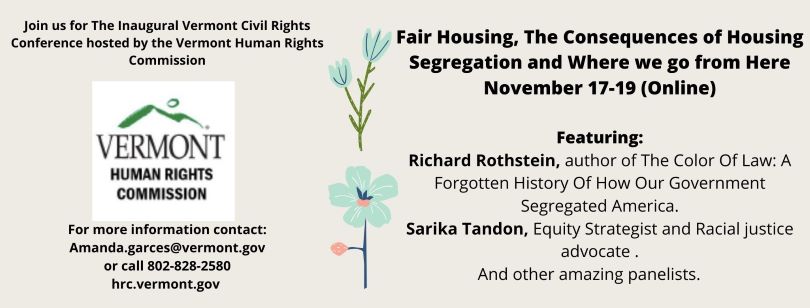
This three-day conference is free and open to the public, and features Richard Rothstein, author of The Color of Law, and Sarika Tandon, Equity Strategist and Racial Justice advocate.
Richard Rothstein is an American academic and author affiliated with the Economic Policy Institute, and a senior fellow, emeritus at the Thurgood Marshall Institute of the NAACP Legal Defense Fund. His current research focuses on the history of segregation in the United States with regards to education and housing, and he is most recently recognized for authoring The Color of Law. We’ve called on the expertise of Richard Rothstein many times in our Thriving Communities blog, most recently highlighting his Op-Ed in the New York Times here.
Sarika Tandon is an equity strategist and racial justice advocate. She consults, teaches, writes, researches, and collaborates at the intersection of race, equity, and environmental issues. Sarika is deeply committed to working within the environmental movement to address issues of racial and environmental injustice and to support the inherent power, brilliance, and well-being of communities of color. She also supports racial equity in nonprofit, education, criminal justice reform, and cultural spheres.
Other workshops include, “Housing Barriers in Vermont: Community Challenges & Collective Solutions – Moving the work forward collectively,” “Vermont’s Housing Crisis: State’s Consolidated Plan – What are we doing about it?” “Fair Housing Act: Critiques and Implications” and “Community Reflections on the Consequences of Housing Segregation and Where we go from Here.” Panelists include representatives from various housing and support organizations, state government, and fair housing advocates – including the CVOEO Fair Housing Project.
All community members are welcome to join. Please see below for additional information about the conference.
Register in advance: https://us02web.zoom.us/meeting/register/tZYtdOyqqzoqHtF6v3iTob9QIcRSvRLnuAux
After registering, you will receive a confirmation email containing information about joining the meeting.
The Vermont Human Rights Commission works to promote full civil and human rights in Vermont by enforcing laws and providing education around equal access to housing, places of public accommodation, and in state government employment. The Commission protects people from unlawful discrimination in housing, state government employment, and public accommodations. Learn more about the VHRC’s at https://hrc.vermont.gov/.
A Creative Take on Housing Advocacy
Downstreet Housing Finds a New Way to Tell Their Story with this rich podcast, Community Pulse, featuring Downstreet’s Executive Director, Eileen Peltier. Already, Downstreet Housing has four episodes published and ready for listening! You can find it on their website at downstreet.org/podcast.
This third episode of Community Pulse features the reflections of Will Eberle, field director for the Agency of Human Services (AHS), serving the Barre and Morrisville District.
Eberle’s voice offers a fresh perspective on homelessness, not just from his background working with homeless individuals through his work at AHS, nor his many roles working with at risk youth at Another Way and otherwise in Vermont communities. But Eberle speaks from his own personal perspective, having been without housing himself.

Eberle shares vivid vignettes of homeless individuals who he has worked with or encountered throughout his life, illustrating just how varied that experience might be and look like. Be it the young adult experiencing homelessness for the first time after exhausting their family resources, the full-time, minimum wage worker who sleeps in their car after full day shifts, or the chronically homeless individual who remains upbeat despite lack of access to permanent housing, Eberle shares their narratives with a frank honesty that personalizes a systemic issue across our state and country.
Community Pulse is a creative and thoughtful way to engage the every-day-listener around the housing crisis in our state, a much needed new take on an old, persistent issue. Centering the voices and experiences of the houseless community -during a time when housing could not be more critical to survival- is key in the shift towards more thriving, equitable communities.
Building Homes Together Campaign Releases Progress Report
Chittenden County has a critical shortage of housing, particularly housing that is affordable to those earning below the Area Median Income. This housing shortage puts a greater burden on marginalized communities by allowing landlords to be more selective in how they rent to tenants and allowing for more discrimination. This recent VPR investigation digs deeper into some of the ways housing segregation continues to persist in communities across New England – including Vermont- and how that impacts the lives of those affected.
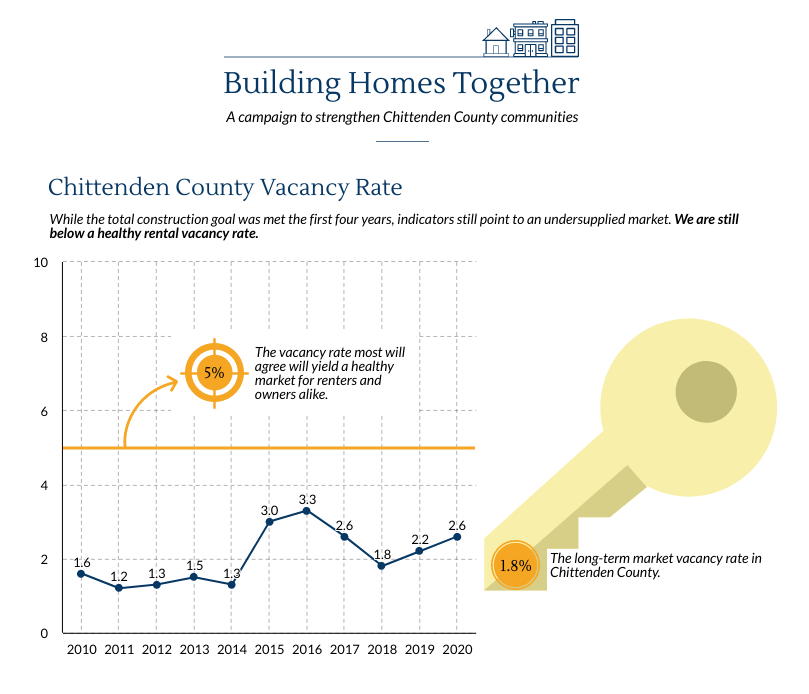
The “Building Homes Together” campaign was started in 2016 to encourage the production of more housing. Its annual report shows that market-rate housing production has been steady for the past four years, but Chittenden County has repeatedly failed to meet the campaign’s target for new permanently affordable homes, leaving a gap for those who are already struggling to make ends meet and those who have been impacted by the economic hardships of the coronavirus crisis.
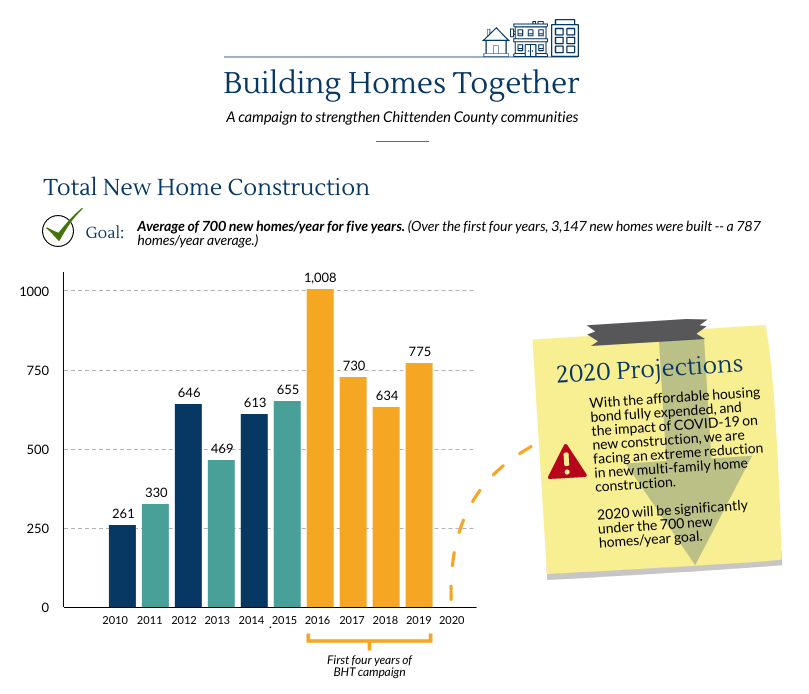
The campaign, supported by over a hundred local and state officials, nonprofits, businesses, and individuals, set a five year goal of 3,500 new homes in Chittenden County with 20% of them permanently affordable. This amounts to an annual target of 700 overall homes with 140 affordable; the average over the first four years is 787 homes, but of those homes only 112 were affordable.
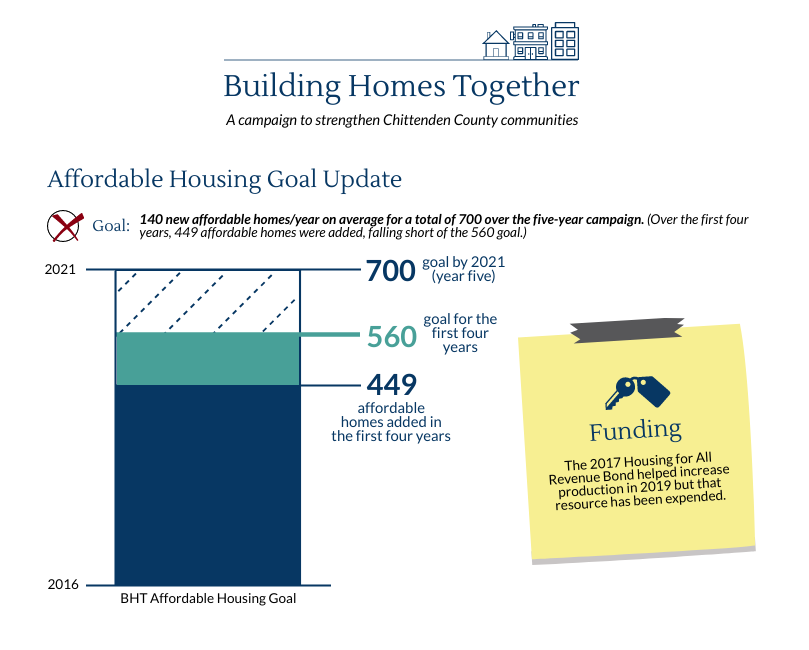
“We did see a spike in 2019 of new affordable homes with 169 built, but that followed three years of missing our target,” said Nancy Owens, co-President of Evernorth. “The increase in 2019 demonstrates that new capital from the Housing for All Revenue Bond passed in the State of Vermont in 2017 was essential to meet this critical housing need, but it hasn’t been enough.”
Other economic, social and public health factors are in play. “While 2020 has been consumed by the coronavirus and calls for racial justice, it’s also been a year where safe, decent and affordable housing has been even more obviously lacking in our communities. We need to do better,” said Brenda Torpy, CEO of the Champlain Housing Trust, noting that at one point this summer there were 2,000 homeless Vermonters living in hotels and motels
Champlain Housing Trust, Chittenden County Regional Planning Commission and Evernorth (formerly Housing Vermont) are jointly calling for local, state and federal policymakers to fund affordable housing and make housing a priority in responding to the economic, racial and health injustices of our current time.
More information about the “Building Home Together Campaign” can be found at http://www.ecosproject.com/building-homes-together/.
ROUND UP: Rental Stabilization Program
COVID-19 takes its greatest toll on the most vulnerable, oppressed, and marginalized in our communities.
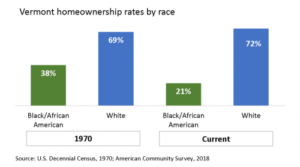
The National Fair Housing Alliance reported an uptick in housing discrimination complaints throughout the pandemic, some of our hardest hit communities nationally included homeless populations and low-income, essential workers, the pandemic disproportionately affected people of color and housing advocates argue the nation’s history of housing segregation is at fault. The pandemic has forced our housing communities to adapt in many ways.
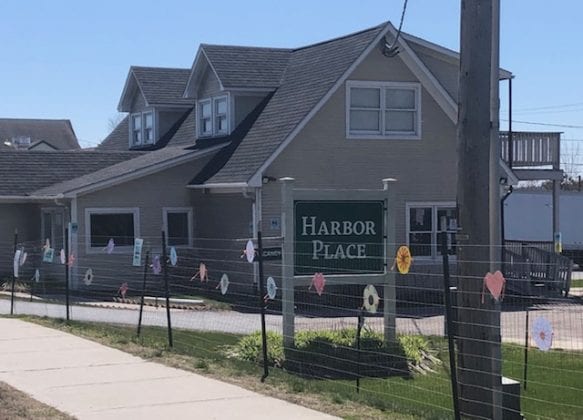
The good news is that here in Vermont we have pulled out some remarkable solutions. This spring housing advocates effectively temporarily ended homelessness in our state. Our own Champlain Housing Trust garnered national attention with this Shelterforce article for its ingenuity with the pre-exisiting Harbor Place, a former motel purchased by Champlain Housing Trust to provide services and transitional housing to homeless individuals. In Woodstock, a mutual aid group, the Woodstock Area Relief Fund, raised $320,000- nearly half of which went to rent and mortgage relief. Vermont passed an eviction moratorium, a critical but complicated law which gave renters much needed relief during a time when unemployment was skyrocketing and many did not know when they would return to the workforce. In April we hosted a Fair Housing Friday about renters’ rights during COVID-19 highlighting the eviction moratorium, which has been extended to Sept. 30. New reports show that Vermont has the 2nd lowest rate of pandemic-related housing insecurity. And this month the Rental Housing Stabilization Program started receiving applications.
If you missed our most recent Fair Housing Friday webinar about the Rent Stabilization program, you can watch the full video here.
The Rental Stabilization funds landlords on behalf on tenants who are in need of help paying past due rent. The program is intended to prevent folks from being evicted so that people can safely shelter in place during the pandemic. For this reason, people can apply even if their rental arrearage is not strictly related to the pandemic and *may* be able to use the program for back rent from before the pandemic. Both the tenant and the landlord have to apply. The program has $25 million and applications are first come, first serve. Applicants have to be income-eligible and their rent has to meet the affordability requirements set by Vermont Housing Finance Agency, about $1,464 for a two-bedroom apartment in the Burlington and South Burlington area, and $1,199 for a two-bedroom in Central Vermont. Two weeks into the program, already an estimated 1,400 households applied for rental assistance.
Some of the questions asked during the webinar:
Q: If I have two tenants behind on rent applying for Rental Rehabilitation program and I only want to keep one of the tenants as a renter, can I apply for one renter and not the other?
A: That sounds like a violation of the Fair Housing Act. It would depend on the situation, and we caution everyone to head state and federal fair housing laws that protect against specific tenants from protected classes.
The point of the program is to provide rental arrearage money so that everyone stays housed where they are.
Q: A lot of the callers to Vermont Tenants hotline don’t have access to the internet and won’t be able to download even a pdf of the application. Where would we refer folks for assistance?
A: You can download the pdf on your phone using mobile data. If you are unable to do that, you can work with your landlord to get the application, call Community Action, call Vermont LegalAid, or call the Vermont State Housing Authority for the application to get mailed to you.
Q: What is the turnaround time for the application?
A: There are 10 working days for Vermont State Housing Authority to respond to the application, which may be a confirmation of a yes – in which case the payment will go directly to the landlord on the 1st and 3rd week of the month, or it may be a referral to Vermont LegalAid.
Q: Will tenants be denied if they indicate on the application that their rent is unsustainable?
A: No. That question is there only if people have the option to move to a more affordable place, and needs help to pay for rent for a more affordable apartment.
Q: If a tenant has already submitted their portion of the application and the landlord has not, how does the tenant move forward?
A: The Vermont State Housing Authority will match applications. If we are not able to get the landlord portion of the application, we will refer the tenant to Vermont LegalAid. If your landlord says they won’t submit an application, you can ask them to call the Vermont Landlord Association. Ultimately, a landlord cannot be forced to apply for the program.
The Vermont State Housing Authority has a full FAQ page which can be found here.
Applications for the Rental Stabilization Program can be found here.
There were a lot of resources we referenced in the webinar, and the full list has been uploaded here.
Always, we ask that if you have questions or concerns about your tenancy, please call our Vermont Tenants Hotline at (802) 864-0099
